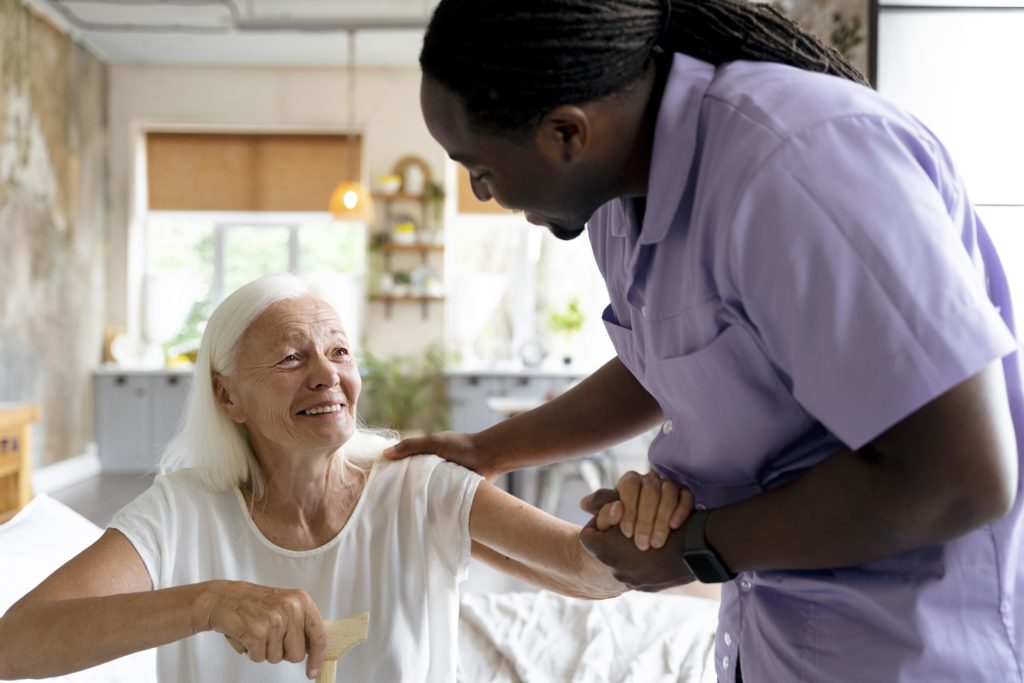Commercial Feature
Cultural Sensitivity in Live-In Care: Meeting Diverse Needs

As the world becomes more diverse, the elderly population needing care reflects this change. Live-in care, which allows people to receive help while staying in their homes, must adapt to these diverse cultural needs. Recognising and valuing cultural differences is key to delivering effective and respectful care.
What is Cultural Sensitivity in Care?
Cultural sensitivity involves recognising and respecting diverse cultural practices, beliefs, and preferences. In live-in care, carers understand and respect the cultural background of the person they care for. This understanding is important for building trust, making the person feel comfortable, and ensuring that care aligns with their values and traditions.
Why Cultural Sensitivity Matters
Providing culturally sensitive care is not only about avoiding misunderstandings; it’s about creating an environment where the person feels valued and respected. When a carer acknowledges and meets the cultural needs of the person they care for, it improves the quality of care. It helps build a strong, trusting relationship.
For example, the National Council on Aging emphasises that culturally aware care can improve health outcomes and well-being for elderly individuals. By integrating cultural sensitivity into care, carers can significantly enhance the emotional and physical health of those they look after.
Key Areas of Cultural Sensitivity in Live-In Care
Religious Practices and Beliefs
- Daily Prayers: Help set aside time for daily prayers according to the individual’s religious practices.
- Dietary Laws: Prepare meals that comply with religious dietary restrictions (e.g., halal, kosher).
- Religious Holidays: Ensure the individual can observe religious holidays and rituals.
- Religious Symbols: Respect and include religious symbols and artefacts daily to provide comfort and familiarity.

Dietary Preferences and Restrictions
- Cultural Foods: Prepare meals that reflect the individual’s artistic preferences and traditional recipes.
- Religious Restrictions: Avoid foods prohibited by religious beliefs (e.g., pork in Islam, beef in Hinduism).
- Family Collaboration: Work with the family to understand and honour dietary preferences and restrictions.
Language and Communication
- Learning Key Phrases: Learn essential phrases in the individual’s language to improve communication.
- Non-Verbal Communication: Understand and adapt to cultural differences in body language, gestures, and eye contact.
- Family Involvement: Recognise the role of family members in communication and decision-making.
Traditional Medicine and Remedies
- Respect for Traditional Practices: Acknowledge and incorporate traditional remedies and healing practices where possible.
- Open Conversations: Discuss traditional medicine with the individual and their family to ensure it is safely integrated into the care plan.
- Collaboration with Healthcare Providers: Work with healthcare providers to balance traditional practices with prescribed treatments.

The Role of Carer in Training and Support
Carers must have the knowledge and skills to provide culturally sensitive care. Training programs focusing on cultural competence are essential in helping carers understand the diverse needs of the people they care for. The International Carer’s Association offers resources and training programs that focus on cultural sensitivity, assisting carers in more effectively addressing the needs of a diverse community.
Ongoing support for carers is also important. Regular discussions with other carers, access to cultural advisors, and continuing education can help carers stay informed and confident in their ability to provide culturally sensitive care.
Additionally, care organisations should consider offering resources such as cultural guides or access to experts in different cultural practices. This support enables carers to better understand and appreciate the cultural backgrounds of those they assist, leading to more personalised and effective care.
Supporting Cultural Sensitivity in Live-In Care: The Agincare Example
Companies like Agincare show the importance of cultural sensitivity in live-in care by offering personalised care that respects and meets the diverse cultural needs of their clients. Agincare trains carers to be aware of and sensitive to each individual’s unique needs, ensuring that every client receives care that is both appropriate and respectful of their cultural background.
Agincare’s training programs emphasise the importance of understanding cultural differences and adapting care to meet these needs. By providing carers with the tools and knowledge they need, Agincare ensures that their clients receive high-quality and culturally respectful care. This method improves the standard of care and improves the overall experience for the individual and their family.
Summary
Awareness of cultural differences is important for delivering considerate and effective live-in care. By understanding and respecting the diverse cultural needs of the people they care for, carers can build strong, trusting relationships and provide care that truly meets the whole person’s needs. As the elderly population becomes more diverse, the importance of cultural sensitivity in care will only increase. It’s important that carers have the knowledge and skills necessary to deliver high-quality, compassionate care.
 Comment / Bonnie Blue is the enemy, not the face, of female liberation13 October 2025
Comment / Bonnie Blue is the enemy, not the face, of female liberation13 October 2025 Features / Beyond reality checkpoint: local businesses risking being forced out by Cambridge’s tourism industry15 October 2025
Features / Beyond reality checkpoint: local businesses risking being forced out by Cambridge’s tourism industry15 October 2025 News / Cambridge climbs to third in world Uni rankings11 October 2025
News / Cambridge climbs to third in world Uni rankings11 October 2025 News / Join Varsity this Michaelmas13 October 2025
News / Join Varsity this Michaelmas13 October 2025 Features / How to spend a Cambridge summer12 October 2025
Features / How to spend a Cambridge summer12 October 2025




